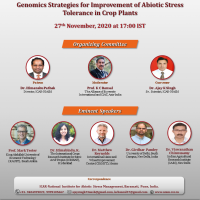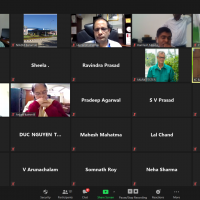Webinar on ‘Genomics Strategies for Improvement of Abiotic Stress Tolerance in Crop Plants' held on November 27, 2020
The ICAR–National Institute of Abiotic Stress Management (ICAR-NIASM), Baramati, Pune in collaboration with the Alliance of Bioversity International & International Centre for Tropical Agriculture (CIAT), Asia-India Office, India organized a webinar on “Genomics Strategies for Improvement of Abiotic Stress Tolerance in Crop Plants” on November 27, 2020. The aim of the webinar was to explore the opportunities of genomics for improvement of abiotic stress tolerance in crop plants, understanding the mechanisms underlying various environmental stress tolerance and also collaborations for abiotic stress research.
Dr. Himanshu Pathak, Director, ICAR-NIASM, highlighted the challenges in enhancing abiotic stress tolerance in crop plants and talked about the opportunities of genomics for developing resilience to environmental stress in crop plants. He suggested that recent advances in various aspects of genomics can be crucial to develop climate resilient crops.
The introductory remark by Director was followed by a brief overview about the webinar by Prof. KC Bansal, Former Director, ICAR-NBPGR and Senior Advisor, Alliance of Bioversity International & International Centre for Tropical Agriculture (CGIAR), Asia-India Office, New Delhi. Prof. Bansal emphasized the need to combine genomics and phenomics approaches with a view to identify novel genes/alleles, QTLs and genomic regions associated with multiple abiotic stress tolerance in crops.
The webinar included experts’ lectures, views and discussions on various aspects of genomics for understanding mechanisms of abiotic stress tolerance, and techniques like CRISPR-Cas for generating climate resilient crops. Prof. Mark Tester from the King Abdullah University of Science & Technology (KAUST), Saudi Arabia, emphasized to discover the novel genes and tolerance mechanisms especially in salt tolerant crops like wild tomatoes, Chenopodium and Salicornia. Dr. Himabindu K, ICRISAT, Hyderabad outlined the integrative omics approach to understand drought tolerance mechanism in chickpea. Dr. Matthew Reynolds, International Maize and Wheat Improvement Centre (CIMMYT), Mexico, highlighted opportunities to improve wheat adaptation to environmental stresses through advances in genomics and phenomics, exploring untapped genetic resources and physiological and molecular breeding. Dr. Girdhar Pandey, University of Delhi, South Campus, New Delhi presented a model to improve K+ deficiency tolerance in rice using CRISPR/Cas9-based genetic engineering. Dr. Viswanathan Chinnusamy, Division of Plant Physiology, IARI, New Delhi explained genetic engineering of rice with ABA receptors. He emphasized that the ABA receptors engineering employing CRISPR/Cas9 mutagenesis can be useful to enhance water use efficiency, tolerance to drought, cold and salinity.
About 500 participants registered for the webinar. The webinar provided an opportunity to almost 150 participants to listen to the experts from India and abroad which included scientists, researchers and students. Prof. KC Bansal as Moderator and Dr. Ajay Kumar Singh as the Convenor played a key role in organizing this event.


